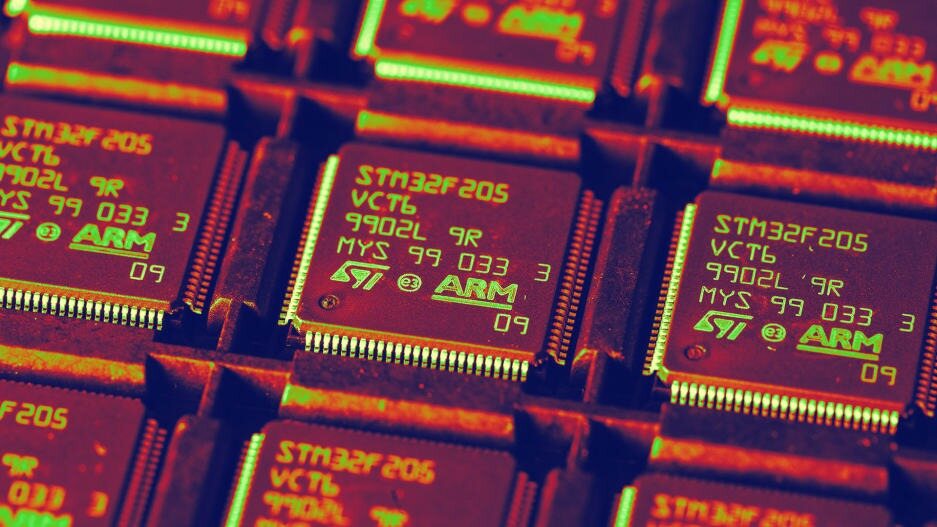- | 8:00 am
Arm’s IPO is set to be the biggest of 2023. Here’s what to know
Arm’s IPO filing offers new revelations about the Softbank-owned semiconductor giant and its plans to go public.

After teasing a public offering for months, semiconductor giant Arm finally, officially, announced plans to go public after the stock market’s close on Monday—and it’s already firing up investors, who have been in the midst of late summer doldrums for the past few weeks.
The IPO by the company, which is owned by SoftBank Group, has been one of the most anticipated offerings of the year and is expected to be its largest. This will be the second time Arm has been public. It began trading in 1998 under the symbol ARMH. (This time around, it will go by ARM.) In 2016, SoftBank purchased the company for $32 billion and took it private.
What is it about this deal that has people excited? Here’s what you should know.
IT COULD BE ONE OF THE BIGGEST TECH OFFERINGS OF ALL TIME
The F1 form, filed with the SEC Monday, does not provide a projected share price for the company, so it’s not possible to estimate its valuation. But there are ways to do some ballpark guess.
Last week, SoftBank bought an additional 25% stake in Arm from the Vision Fund investment unit. That deal valued Arm at a little more than $64 billion, The Wall Street Journal reported at the time. If that valuation holds up, it would make Arm bigger than many major companies, including UPS and Visa, though below the $169 billion market value of Alibaba when it went public in 2014 and the $81.25 billion value of Facebook when it began trading.
SoftBank’s valuations aren’t always reliable, though. Just look at WeWork, which had a $47 billion valuation in 2019. Today, its market cap is around $285 million, and the company is trying to avoid being delisted from the New York Stock Exchange.
Last month, Bernstein analysts said they calculated Arm’s fair-market value to be in the $40 billion range, well below the recent valuation. (Bernstein has not yet issued an update to that, given the additional information provided in the F1.)
SOFTBANK IS STILL FIRMLY IN CHARGE
The AI rush and Arm’s key role in it has seemingly brought about a change of heart at SoftBank. In 2016, the company planned to sell Arm to Nvidia. Regulators pushed back against that, though, and the deal was scuttled. That’s when IPO chatter began to emerge.
But as last week’s purchase from Vision Fund illustrates, SoftBank isn’t planning on divesting itself of the company now. The listing does not say how much stock SoftBank plans to sell, but it does say that Arm will be a “controlled company,” meaning the majority of the voting power is controlled by a single person or entity—SoftBank. (It’s not unlike Meta, where Mark Zuckerberg has power over the board’s votes.)
THIS COULD KICKSTART THE IPO MARKET
We’re in an IPO rut these days. While there have been a few successful debuts, the tech industry has been largely non-existent in the IPO market for about 20 months. The last big tech IPO was IBM’s spin-off of its self-driving car tech company.
The exact timing of Arm’s IPO is still unclear, but if Arm makes the leap, it could clear a path for other tech companies that have hit pause on their own plans to go public. Of course, should the stock fall short, it could extend the deep freeze, with companies like Instacart and Reddit continuing to delay their IPOs.
IT’S THE YEAR’S BIGGEST OFFERING, BUT REVENUES ARE DOWN
While there’s plenty of investor excitement that an Arm listing is about to happen, those same investors were scouring the F1 and looking at the company’s numbers. There wasn’t a lot there to excite them.
In fiscal 2023, which ended in March, the company reported net income of $524 million on $2.68 billion in revenue. Those sales numbers are virtually equal to what it made in 2022 (when it reported $2.7 billion).
IT’S RIDING THE AI WAVE. THE QUESTION IS: IS IT LATE TO THE PARTY?
Arm, unlike other businesses that are tied into the artificial intelligence field, doesn’t make chips. Instead, it designs technology for companies like Nvidia and Apple. In its filing, it argued that its technology is an essential part of AI technology.
“As the world moves increasingly towards AI- and ML-enabled computing, Arm will be central to this transition,” it wrote. “The CPU is vital in all AI systems, whether it is handling the AI workload entirely or in combination with a co-processor, such as a GPU or an NPU. In the emerging area of large language models, generative AI and autonomous driving, there will be a heightened emphasis on the low power acceleration of these algorithms. . . . We are working with leading companies such as Alphabet, Cruise LLC, Mercedes-Benz, Meta, and NVIDIA to deploy Arm technology to run AI workloads.”
Companies with strong ties to the AI industry, like Nvidia, Broadcom, and Intel, have all seen bumps in their share price, but investor enthusiasm isn’t quite as frenetic as it was earlier this summer.







































